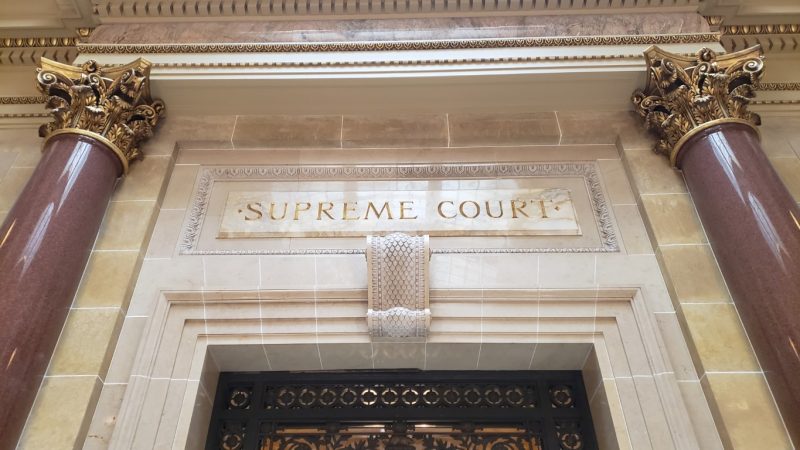Dane County Judge Jill Karofsky defeated conservative Daniel Kelly in the state Supreme Court race, becoming just the second person to knock off a sitting justice in 53 years.
With just more than 60 percent of the precincts in, Karofsky had 53 percent of the vote.
In a video conference call with reporters, Karofsky celebrated her victory, but bemoaned an election beset by questions over whether in-person voting should’ve been allowed during the COVID-19 pandemic and issues about the flood of absentee ballots that were cast.
“We can never, ever, ever in this state or this country have a repeat of the voter suppression tactics that we saw on Tuesday,” she said. “That can never happen again.”
Karofsky’s win will cut down the conservative majority on the court to 4-3 when the new term begins Aug. 1.
It also means control of the court will be up for grabs in 2023, when Chief Justice Pat Roggensack, who turns 80 on July 7, would be on the ballot for another 10-year term.
Karofsky appeared to get a boost from the Dem presidential primary that was on last week’s ballot, even if the race was on its last legs, as well as the races for Milwaukee mayor and county exec.
Turnout was up across the state compared to the 2019 Supreme Court race. But Kelly fell behind the numbers that fellow conservative Brian Hagedorn hit in Waukesha, Ozaukee and Washington counties, a key area that helps drive the winning campaigns of Republicans and conservatives in Wisconsin.
He also fell short in other key counties.
For example, with most of the vote counted in Kenosha County, Karofsky was at 55 percent, while Kelly was at 41 percent.
In last year’s Supreme Court race, conservative Brian Hagedorn took 51.5 percent of the vote there.
Kelly noted he often said during campaign stops that the people of Wisconsin were his bosses and the court’s authority was on loan from them according to the terms of the constitution.
“The expiration of the time and authority loaned to me is a reminder that our system still works — that our Constitution endures through every test and trial, and that here in America the lawful will of the people shall always prevail,” he said in a statement.
The COVID-19 pandemic and ensuing stay-at-home order that Gov. Tony Evers issued put the race in new territory as campaigns looked for ways to reach voters without traditional GOTV efforts such as knocking on doors. The health emergency also drowned out media attention.
But before the pandemic began to dominate the headlines, the race was marked by a series of shots Karofsky took at Kelly, accusing him of being so beholden to conservative special interests that it amounted to corruption.
Kelly accused his opponent of slander and demanded she apologize to him, saying she was taking shots at his colleagues as well.
Roggensack and fellow conservative Annette Ziegler denounced what they called attacks “on the integrity of the court” and urged those “seeking judicial office to be mindful and act with the decorum appropriate to the office.”
Neither publicly endorsed Kelly. Meanwhile, conservatives Rebecca Bradley and Hagedorn, who did back their fellow justice, called Karofsky’s “slanderous statements” “evidence of her lack of fitness for this bench.”
Following her victory, Karofsky said she planned to reach out to her new colleagues in the coming days.
“I’m looking forward to sitting down with them over a cup of coffee or a good Wisconsin beer so we can put our differences aside so we can go to work and we can make decisions for the people of Wisconsin,” she said. “I don’t anticipate any problem with that.”’
Hagedorn struck a conciliatory tone in an interview with WisPolitics.com. He said Kelly’s work ethic and intelligence will be missed on the court, but he also welcomed Karofsky and said he looked forward to working with her.
Bradley, however, said she stood by her statement and called Karofsky a “political actor who is not fit to sit on the state’s highest court.”
“I don’t know if she’ll ever attempt to repair the damage she’s afflicted on the judiciary or on the court with her scandalous attacks against us,” Bradley said in a phone interview. “But she ran one of the most partisan political campaigns I think in Supreme Court history. I fully expect her votes to be as political and outcome oriented as she promised us they would be.”
The race received additional attention due to Wisconsin’s status as a top swing state in the fall election, and both sides had their GOTV operations engaged in the closing days. President Trump endorsed Kelly, while both Joe Biden and Bernie Sanders backed Karofsky in the days before in-person voting April 7.
Like Kelly, the last sitting Supreme Court justice to lose a race had been appointed to the bench. While Scott Walker named Kelly to the seat in 2016, then-Dem Gov. Jim Doyle appointed Louis Butler to the Supreme Court in 2004.
Four years later, Butler lost to conservative Michael Gableman. It was the first time a sitting justice had lost a race since 1967, when then-Chief Justice George Currie lost his bid.
Spring state Supreme Court races don’t always predict the fall presidential races. In 2008, after Gableman knocked off Butler with 51 percent of the vote, Dem Barack Obama won Wisconsin’s electoral votes with 56.2 percent of the vote, producing the latest margin of victory in a state presidential contest since Lyndon Johnson in 1964.




